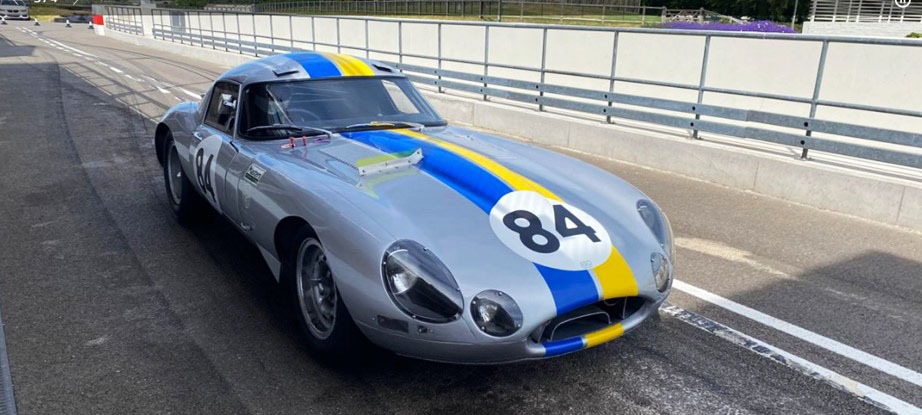
The Historic and Classic Vehicles Alliance (HCVA), CKL Developments and Sustain by Coryton team up to commence synthetic fuel testing for the historic sector…
The HCVA tells us:
|
Tuesday 21st June 2022 saw the achievement of a significant milestone in the progress towards future fuels for the Historic and Classic vehicles sector. CKL Developments, Jaguar racing specialists, a Founding Partner member of the Historic and Classic Vehicles Alliance (HCVA) ran a customer’s racing E Type Jaguar at Goodwood using specialist fuel from Sustain by Coryton. They provided a special development synthetic fuel (note – in fact a second generation biofuel) to match the characteristics of the current racing fuel used in the Jaguar. This had a lead-free valve lubricant added and contained no Ethanol. This first test ran with a blend of the Sustain by Coryton Synthetic fuel and current fuel. The car ran faultlessly all day and delivering the same performance as current racing fuels. |
|
This is the first step on a journey to future fuels and net-zero CO2 emissions for the Historic and Classic sector. The HCVA, CKL Developments and Sustain by Coryton, working with others will continue to develop and test the fuels on a range of Historic and Classic vehicles. These tests will include engines on dynamometers and several road and race vehicles. “We are pleased to support the future of our Historic and Classic industry and owners through the development of these fuels and are extremely thankful to Coryton and CKL Developments for this first test and also to the customer who allowed the use of his car. The car will feature shortly in a display in Parliament demonstrating the full range of future options available for carbon reduction in the motorsport and historic sectors” said Garry Wilson, CEO, HCVA. James Fraser, MD of CKL Developments said “The test went well. The car didn’t miss a beat all day. We look forward to developing these fuel technologies further to support the whole classic car sector”. David Richardson, director at Coryton, said: “Sustainable fuels can play a huge role in the future of historic and classic cars, and it’s fantastic to be starting to put some fuels to the test. We look forward to working with the HCVA and its members including CKL Developments to advance these fuels for the sector.” |
About the HCVA:
The ‘not for profit’ alliance was launched in 2021 with a mission to protect and promote the sector and secure its long-term future. It campaigns on behalf of individuals and companies in the classic vehicle world including specialist restorers, dealers, parts suppliers and a broad cross section of the multi-billion-pound industry.
In just a few months the HCVA has built a strong membership base across the industry, owners and enthusiasts. It has attracted widespread publicity in mainstream and specialist media and gained the support of politicians, campaigners and leading industry and motorsport figures. Amongst the HCVA’s early achievements have been to:
- Open a new dialogue with the DVLA to seek solutions to the problem of issuing of original or
age-related registrations; supporting the establishment of the DVLA Historic Vehicle User Group.
- Campaign to raise awareness of challenges around the introduction of E10 fuel andpresented to the Transport Select Committee of the future availability of fuel for the sector.
- Submit a response to and provide data for debates on the “Tampering” bill with MP’s mentioning the HCVA by name in reaching agreement that the sector should be exempted.
- Engage on behalf of the sector on ULEZ, impacts of recalls on Modern classics, Brexit, youth, skills and diversity positive progress and supported members at events, discussions, etc on a wide array of topics.
The sector’s contribution to the UK economy is huge. Annual turnover including substantial international trade is estimated at £18.3 billion, the three-million-strong British classic fleet is valued at over £12 billion and annual tax revenue generated for the exchequer is close to £3 billion.
The trade, in which British craft skills and engineering excellence lead the world, supports around 113,000 jobs in thousands of specialist small businesses and supply chain firms. It also provides training places and apprenticeship schemes, giving opportunities to young people.
Kim adds: “The successful testing of a classic engine running on a blend of sustainable synthetic fuel as described represents good news, especially for classic car enthusiasts. The development of carbon-neutral synthetic fuels/e-fuels has the potential to enable internal combustion engines of all types to be operated into the future in an environmentally-friendly way, reducing/eliminating the need for fossil-based liquid fuels in such engines, while helping achieve ‘net zero’ more quickly… As has often been stated, it is not the type of engine but the fuels used that dictate harmful emissions”.